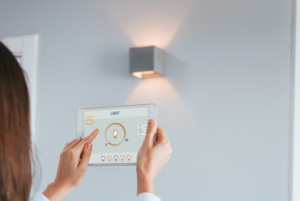At Edintel, we focus on 4 main areas for the timely and efficient maintenance and operation of smart buildings. In this blog, we will explore each of them and their importance for this type of buildings.
- FIRE DETECTION AND SUPPRESSION
 Fire detection and suppression in intelligent buildings is vitally important for a number of reasons, contributing to the safety of people, the protection of property and the integrity of infrastructure. A few key reasons are highlighted here:
Fire detection and suppression in intelligent buildings is vitally important for a number of reasons, contributing to the safety of people, the protection of property and the integrity of infrastructure. A few key reasons are highlighted here:
- Protection of Human Lives:
-
- Early fire detection enables timely and safe evacuation of people in the building.
- Intelligent building fire detection systems can send automatic alerts to emergency authorities, improving response times and coordination in critical situations.
- Property and Asset Protection:
-
- Rapid detection and response to a fire can help minimize property damage by enabling early intervention by emergency services.
- Intelligent systems can automatically activate fire suppression systems, such as sprinkler extinguishing systems or clean agent systems, to control the spread of fire.
- Integration with Building Management Systems (BMS):
- In smart buildings, fire detection and suppression can be integrated with building management systems to coordinate automatic responses, such as smoke ventilation, opening evacuation doors, and notifying security personnel.
- Minimization of False Alarms:
- Advanced smart building fire detection systems use more sophisticated technologies, such as combined smoke and heat sensors, which reduces the likelihood of false alarms and improves system reliability.
- Remote Monitoring:
- Smart technology enables remote monitoring of fire detection and suppression systems, facilitating constant supervision by security personnel or external monitoring services.
- Environmental Damage Prevention:
- Early detection not only protects people and property, but can also help prevent environmental damage by controlling the spread of fire and minimizing the release of toxic substances
- ENHANCING ELECTRONIC SECURITY IN INTELLIGENT BUILDINGS
 Electronic security plays a crucial role in smart buildings, as they incorporate advanced technologies to improve efficiency, comfort and sustainability. Below, we highlight some key points about the importance of electronic security in smart buildings:
Electronic security plays a crucial role in smart buildings, as they incorporate advanced technologies to improve efficiency, comfort and sustainability. Below, we highlight some key points about the importance of electronic security in smart buildings:
- Data Protection and Privacy:
- Smart buildings collect and use data from multiple connected devices. Electronic security ensures the protection of this data, preventing potential privacy breaches and unauthorized access.
- Advanced Access Control:
- Electronic security systems enable more advanced access control through technologies such as smart cards, PIN codes, biometrics, or even mobile device-based solutions. This improves security by reducing the risk of unauthorized access.
- Surveillance and Continuous Monitoring:
- The installation of security cameras and real-time monitoring systems contributes to the early detection of risk situations, such as intrusions or suspicious behavior, enabling an immediate response.
- Integration with Building Management Systems (BMS):
- Electronic security can be integrated with the building management system for a more coordinated response. For example, in the event of an intrusion alarm, the system can automatically lock access doors and notify the appropriate authorities.
- Lighting and Surveillance Automation:
- Electronic security can leverage automation to control lighting and surveillance based on environmental conditions or time of day, which helps deter suspicious activity and improves visibility in critical areas.
- Rapid Emergency Response:
- Electronic security systems can provide automatic alerts to emergency services, shortening response times in critical situations and improving the ability to handle emergencies efficiently.
- Remote Maintenance:
- The ability to perform maintenance and security updates remotely facilitates management and improves the operational efficiency of the security system.
- INNOVATIVE TRANSFORMATION WITH AUTOMATION
 Automation plays a key role in smart buildings, bringing numerous benefits in terms of operational efficiency, comfort, sustainability and safety. Here we highlight some key aspects of the importance of automation in smart buildings:
Automation plays a key role in smart buildings, bringing numerous benefits in terms of operational efficiency, comfort, sustainability and safety. Here we highlight some key aspects of the importance of automation in smart buildings:
- Energy Efficiency:
- Automation allows centralized control of systems such as heating, ventilation, air conditioning (HVAC), lighting and power. This optimizes the use of resources and reduces energy consumption, contributing to the building’s energy efficiency.
- Lighting and HVAC management:
- Automated systems adjust lighting and temperature according to environmental conditions and the presence of people. This not only improves occupant comfort, but also reduces energy waste by ensuring that these systems are active only when needed.
- Device and System Integration:
- Automation facilitates the integration of devices and systems into a centralized platform. This includes connecting sensors, security cameras, building management systems (BMS) and other devices for a more cohesive and efficient operation.
- Operational Cost Savings:
- Optimizing systems through automation leads to long-term operational cost savings as resources are used more efficiently, downtime is reduced, and the need for constant human intervention is minimized.
- Environmental Sustainability:
- Automation contributes to more sustainable practices by minimizing resource waste, reducing carbon emissions, and facilitating the implementation of green technologies such as renewable energy systems and waste management.
- CONNECTING THE FUTURE: INNOVATION AND TRANSFORMATION IN THE TELECOMUNICATIONS WORLD
 The integration of telecommunications systems into the smart building infrastructure provides a solid foundation for connectivity, communication and data management. Here are some key reasons that highlight the importance of telecommunications in smart buildings:
The integration of telecommunications systems into the smart building infrastructure provides a solid foundation for connectivity, communication and data management. Here are some key reasons that highlight the importance of telecommunications in smart buildings:
- Device Connectivity:
- Telecommunications enable the interconnection of a wide variety of devices in a smart building, including sensors, actuators, security cameras, lighting systems, appliances and more. Efficient connectivity is essential for coordinated operation and real-time data collection.
- Wireless Networks:
- Telecommunications facilitates the implementation of wireless networks that are essential for occupant mobility and the connection of mobile devices. This allows access to services and data from anywhere within the building.
- Communication between Systems:
- The connectivity provided by telecommunications enables seamless communication between the different systems present in a smart building, such as building management systems (BMS), security systems, energy systems, lighting systems, among others.
- Remote Management:
- Telecommunications enable remote management of building systems, allowing managers and owners to monitor and control systems from remote locations. This improves operational efficiency and facilitates remote maintenance and upgrades.
- Security and Surveillance:
- Telecommunications are essential for security and surveillance systems, such as transmitting data from security cameras, access sensors and alarm systems to monitoring centers or mobile devices, facilitating rapid response to security events.
- Energy Management:
- Energy management systems in smart buildings rely on telecommunications to collect real-time data on energy consumption and control related devices, such as lighting systems, to optimize energy efficiency.
At Edintel we transcend conventional boundaries by merging the four fundamental areas: fire detection and suppression to safeguard lives, electronic security that protects with precision, automation that optimizes efficiency and telecommunications that connect the present and the future. Ask about our solutions and we will be happy to advise you.




